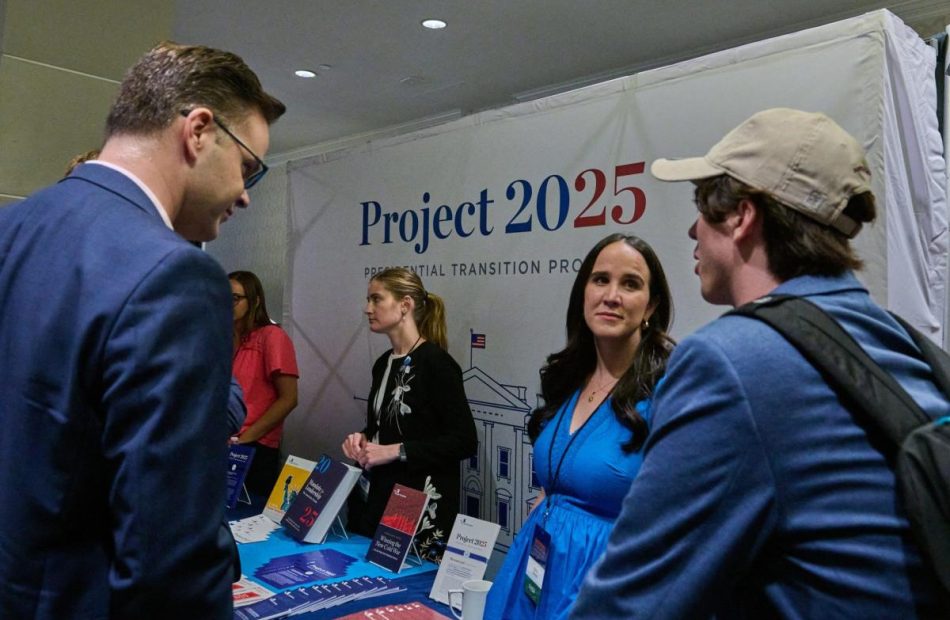Project 2025: Will the rich ever pay tax again?
There’s pretty much nothing to like about Project 2025’s dystopian vision for America. Whether it’s the elimination of abortion rights or the elimination of the Department of Education, it’s all horrifying. Here’s just one of the many appalling declarations in Project 2025: “Our Constitution grants each of us the liberty to do not what we want, but what we ought.”
Given the radical overall thrust of Project 2025, it’s easy to lose sight of its more mundane contents, like its tax agenda. But the tax proposals of Project 2025, if ever enacted, would be no less dangerous to our happiness and well-being than the restrictions on individual freedom. They would practically guarantee the concentration of the country’s wealth in the hands of a group of billionaires and trillionaires who would be insulated from meaningful federal taxation. The resulting concentration of political power would destroy whatever is left of our democracy, clearing the way for the imposition of Project 2025’s extreme social agenda.
The most often discussed tax proposals of Project 2025—reducing the corporate tax rate to 18% or less, the individual income tax rate to 30%, the tax rate on dividends and capital gains to 15%, and the maximum estate tax rate to 20%—all obviously move us in that direction.
But a Project 2025 proposal that is receiving much less public attention, Universal Savings Accounts (USA), could do far more damage.
On the surface, Project 2025’s USA proposal seems like just one more misguided retirement savings incentive that favors the rich. It would allow any taxpayer to contribute up to $15,000 of after-tax earnings to a USA.
Functionally, USAs would be similar to Roth IRAs. A contribution to a USA, like a contribution to a Roth IRA, would not by itself reduce a person’s tax liability. And, as is the case with a Roth IRA, all the earnings of a USA would escape tax.
But USAs would not function merely as larger Roth IRAs. Their tax avoidance potential would be infinitely greater. They would have the potential to exempt multi-billion dollar gains, even trillion-dollar gains, from taxation.
Investigative journalists have shown that some of America’s wealthiest billionaires have gigantic Roth IRAs. But these big names grew their Roth IRA fortunes, at least technically, by savvy investing. And that’s where the tax avoidance potential of USAs will be far greater. The Project 2025 white paper calls for USAs to be “highly flexible and for taxpayers to be able to invest their USAs as they see fit, including, for example, in a closely held business.” Current rules applicable to Roth IRAs make investing in a closely held business virtually impossible, except as a purely passive investor.
That’s a huge difference. If USA holders are able to invest in their own closely held businesses, as Project 2025 contemplates, the potential income tax avoidance is unlimited. After all, although $15,000 is not a lot of money, it’s enough, and certainly, several years of $15,000 deposits into a USA are enough to start a business in one’s garage. This means that the growth of a garage-based business could be shielded entirely from federal income tax.
The list of businesses that started in the founder’s garage include, to name a few, Disney, Mattel, Microsoft, Amazon, Dell, and Google. Subway started as a single small shop and grew to its current size of approximately 37,000 locations. Had USAs been available to the founders of those now enormous companies, several of which now have market capitalizations in the trillions of dollars, the bulk of their lifetime gains would be entirely exempt from federal income tax.
Here’s how it would work: When the next Bill Gates or Jeff Bezos conceives an idea for a business, they will create a corporation by simply submitting documents to a state government office. The corporation’s value initially will be zero. Then, our future billionaire (or trillionaire) will cause the corporation to issue stock to their tax-free USA in exchange for the modest seed capital needed to start the business. The corporation then can borrow money, issue more stock to outside investors, and hire employees. Eventually, our future mogul will be sitting on a stupefying fortune, all held in a USA, and all entirely exempt from income tax.
The bottom line here is that Project 2025 would have the founders of future mega businesses that start small—and pretty much every business starts small—paying little or no tax on what could be a trillion dollars or more of income over the course of a lifetime. The resulting concentration of the country’s wealth will dwarf even the Gilded Age-like level of wealth concentration that exists today.
More must-read commentary published by Fortune:
The opinions expressed in Fortune.com commentary pieces are solely the views of their authors and do not necessarily reflect the opinions and beliefs of Fortune.
This story was originally featured on Fortune.com





Leave a Reply